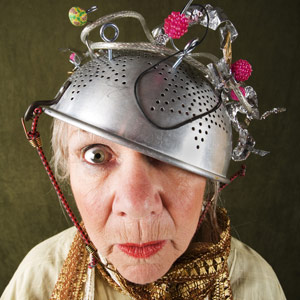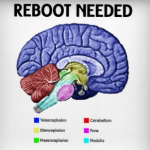When I was a “seasoned” nurse, the first thing I would tell new psych nurses was to throw out everything they learned in books. I explained that although saying sweetly “I’m concerned about you….. for whatever reason” may work with neurotic folks who just want to talk, that it wouldn’t get you anywhere in an acute situation with someone who was paranoid, psychotic, and potentially dangerous (usually men). The standard “by the book” approach is missing one critical element.
Having spent over 35 years as a psych nurse, I consider myself an old pro. First just on the floor of several psychiatric units as a general nurse, then as the Director of the Stanford Hospital Psych. Day Treatment Center until California stopped funding those. I moved on to become the Ass’t Head Nurse for many years and the unit’s couple and family group therapist until I went part-time. I then specialized in assaultive behavior response and defense and taught that at Stanford for the psych units and other departments in the hospital until I retired. I’ll share with you here a few things that I taught younger nurses that will apply in any situation in life, whether you’re dealing with a disturbed stranger or a mentally unstable family member.
Truck Stop Waitress
When facing a mentally unstable person my first advice is to emulate a truck stop waitress – friendly but not invasive in any way. The waitress just wants to go about business and get you what you need. That means keeping a good distance, like 6 feet, and saying something like “Hi, what’s going on?” without any affect.
If you don’t get any response, ask the person to do something easy like “Could we walk up and down the hall together for a bit and not even talk?”. If the patient does that – you have a relationship. If the patient has clenched fists, you can say “I see that your fists are clenched. That scares people. Could you relax your hands?” If he does that, you have a relationship – a request and a response.
Then you can ask if he would be willing to just go in his room for awhile (to reduce the stimulation of other patients and noise in the hall). If he does that, you’re on your way. Then you can go back a little later and ask “How ya doing now” and offer him some medication – which he is more likely to take now that you have a relationship. Too many nurses just walk up and try and get the person to take medication, and usually fail.
Of course, if none of this works and the person is looking as if he will act out with violence (the signs of which are too detailed to go into here), then you alert your team and try a full team approach with a security guard to try to convince the person to go into their room. If he won’t and if violence seems eminent, and only then, do you organize your team for a physical take-down and then usually restraints. Unfortunately, this happens far too often because nurses are inexperienced or too afraid and don’t know what to try first.
Building a Relationship
How far you go in life depends on your being tender with the young, compassionate with the aged, sympathetic with the striving, and tolerant of the weak and strong. Because someday in your life you will have been all of these — George Washington Carver
Someone to tell it to is one of the fundamental needs of human beings. You just need to learn how to be there for them, in the way where they can open up and share.
Don’t Overreact
All of the above requires a realistic evaluation of the potential for violence or self-harm. If a patient just rips out the hall phone for patient’s use (happens often) – what is the danger or the harm, other than replacing the phone? This requires a verbal intervention about what’s going on and a later offer of medication, but if nothing more happens – that’s it. Too often I have seen or heard about take-downs and restraints for just this kind of action (minor property damage), which is totally inappropriate.
Another example of over-reaction is if a patient tries to choke themselves with their own hands. I have seen this many times. It usually happens at the desk for full impact. This is an hysterical behavior that does express major distress, but it is not dangerous. It is impossible to choke yourself effectively with your hands. Most staff respond to this in an equally hysterical way – trying to remove the hands, and often doing a take-down and restraints. This is so inappropriate that it is bizarre. All that is required is a verbal intervention about the person’s obvious distress, some one-to-one time, and an offer of medication.
My own mother, who was supposedly suicidal or dying from something my whole life (and died of natural causes at the age of 93), gave me many opportunities to help the caregivers she had in her later years to evaluate the danger of her behavior. Once she crawled out into the yard (she could have walked) and laid down saying she was going to stay there until she died. No danger here! The caregiver on duty called me – frightened and thinking she should call the local emergency response team on the small Washington island where she was living. This volunteer team was already fed-up with calls from/for my mother. I told the caregiver to take out a blanket and pillow, ask if she wanted anything else, and to just go and talk with her briefly but regularly about how she was doing. After a few hours, she crawled back inside and went to bed. A successful intervention!
Humor Works Great (sometimes)
 I always used a lot of humor too. Everyone likes to smile and laugh. This isn’t natural for all staff, so don’t try too hard if it isn’t! I’ll give you an extreme example. I was trying to get a very paranoid and psychotic man to go into his room (again to avoid the stimulation of being in the hall). I had been working with him for about 5 minutes in front of the desk where the other staff were, when I whispered to him “Don’t make me look bad”. To my amazement, he smiled and went into his room!
I always used a lot of humor too. Everyone likes to smile and laugh. This isn’t natural for all staff, so don’t try too hard if it isn’t! I’ll give you an extreme example. I was trying to get a very paranoid and psychotic man to go into his room (again to avoid the stimulation of being in the hall). I had been working with him for about 5 minutes in front of the desk where the other staff were, when I whispered to him “Don’t make me look bad”. To my amazement, he smiled and went into his room!
Sometimes just the level truth works well with psychotic patients too. I was at the desk once when a very crazy (yes, we use that term too) and paranoid white male came up and said that an equally crazy and paranoid black male patient was calling him a “fat nigger toe”. This was obviously a projection (and an odd one!), but I didn’t go into that. Neither seemed to be in a zone of impending violence (for perceived self protection), which can happen in these situations. So I said to him “Not only are you white, but he’s fatter than you are”. He thought for a bit, nodded, and walked off. The black unit clerk almost fell off her chair laughing.
The Secret Ingredient
I wish something like this could be published in a journal for psych nurses. But it never would. It’s not “professional” enough. As you have realized by now, my secret ingredient for dealing with mentally disturbed people is building a relationship first. Stop being so professional and start being a real person. The best psych nurses are creative. I taught that their job was to try and get patients to do want you wanted them to do with your mouth – not with physical intervention if possible. Maybe this isn’t something that can be taught. You may have to have been born with those skills. I had them as they came from a crazy family.
*** Article written by a long time personal friend Heather White.


 What You Need to Know About Your HPA Axis in Order to Manage Irritability More Effectively
What You Need to Know About Your HPA Axis in Order to Manage Irritability More Effectively Why We Shout in Anger – an Ancient Hindu Parable Cuts it Straight Through the Heart
Why We Shout in Anger – an Ancient Hindu Parable Cuts it Straight Through the Heart How to Get Angry at Your Kids So That They Still Adore You
How to Get Angry at Your Kids So That They Still Adore You